It would be easy to miss the Chasselas vines growing outside the Maison du Balzac museum in the affluent 16th arrondissement of Paris, or those clinging to a pergola in Place Catherine-Labouré on Rue de Babylon on the Left Bank. Most people who walk by are hurrying inside the museum, or on their way to the upmarket boutiques of Saint-Germain-des-Prés, and miss the meticulously-cared-for produce of the ‘vignerons de balcons’ – balcony winemakers – of Paris.

There are four official vineyards in Paris, which are looked after by the city – Bercy, Montmartre, Parc Georges Brassens and Belleville – but perhaps 200 more of these small-scale balcony winemakers. Many grow just a few vine plants and make an annual harvest for personal consumption, or to share with friends and family, or to auction off for charity. Most have day jobs that are far removed from wine – doctors, teachers, civil servants, artists – and the wine is made in a variety of buckets and barrels in their garages or kitchens.
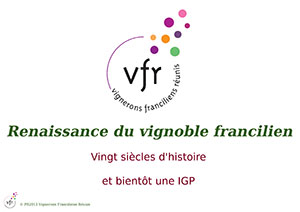 Image courtesy of Les Vignerons Franciliens Réunis
Image courtesy of Les Vignerons Franciliens RéunisThese balcony winemakers don’t have official planting rights and so are not allowed to sell the wine they produce. This is also true of the four official city plots of vines, which are famous for their yearly harvest festivals where the wine is auctioned off for charity. Although there is an estimated 45 acres of vines across Paris and the surrounding Île-de-France, just 2.5 acres in Suresnes has official European Union status as a commercial vineyard and so is allowed to sell its production. The vines of Suresnes – that have a view of the Eiffel Tower from their highest point – began life in the 9th century producing communion wine for the church in Saint-Germain-des-Prés, and in the 13th century became popular for soothing the sick at the Hotel Dieu. Although today these chardonnay vines make just 5,000 bottles per year, Suresnes is likely to soon receive IGP recognition – the category that has replaced Vins de Pays for wines from a specific geographic indication.
‘I hope we will have five IGPs within the Ile de France in the next five years,’ Patrice Bersac of lobbying group Les Vignerons Franciliens told me when I visited him in Paris last week. ‘Starting with Suresnes in 2013, which is currently bottled as a table wine but deserves to be fully recognised for its quality.’
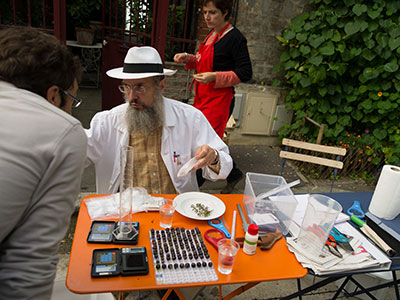 Image: Patrice Bersac in action, courtesy of Patrice Bersac
Image: Patrice Bersac in action, courtesy of Patrice BersacBersac is president of Les Vignerons Franciliens, a group created in 1998 that is aiming to give Paris back its winemaking heritage. Based in Bercy, the old winemaking district whose park contains one of the four official city vineyards, Bersac himself is a balcony winemaker. His small apartment – which doubles as the headquarters of Les Vignerons Franciliens – is also something of a laboratory. He points out a small hook on his living room ceiling where he has experimented with hanging grapes to dry them out for the production of sweet wine, and his galley kitchen is lined up with cakes made from dried-grapes, pinot noir wine vinegar, and an assortment of plastic bottles containing wine at different stages of production. ‘I am not an oenologist, but I trained as an engineer and use my scientific background to teach myself, and then call on experts where I need it.’
Bersac made his first wine in 1993, from the Baco Noir hybrid variety, and now helps plant other vineyards, and acts as a consultant to the winemakers. His early career was in provisions and logistics for the army, before spending nine years working as a senior civil servant and finally as an economic consultant for Vins de Pays wines.
He created Les Vignerons Franciliens in 1998, and went full-time on the project (which is funded by private money) in 2011. ‘When Parisian winemaking was at its height, in 1852,’ Bersac tells me, ‘there were 108,000 acres of vines in the area (compared to, for example, 69,000 acres in Burgundy today). By 1929 there were just 6,797 acres left, and today 45. Those vines need to be protected.’
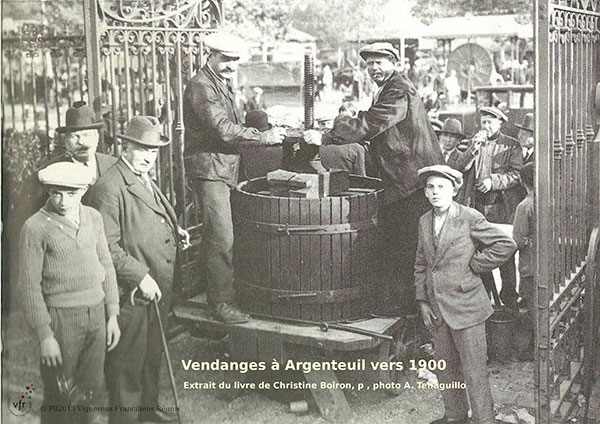
Bersac has plans for a teaching nursery in the region, growing 200 different grape varieties to study which are best adapted to the Parisian climate, and experimenting with different trellising methods for training the vines. He is also looking at exporting his expertise to China – specifically Yunnan province. ‘I am looking at a project to create an educational vineyard there, similar to one we already have in Paris in the Parc Departemental de Sausset, near Roissy airport. Here school children have planted reference vines, and they are learning about vine growing, and getting exposure as inner city children to the rural heritage of France. These programmes can be educational, and can also attract tourism to the area.’
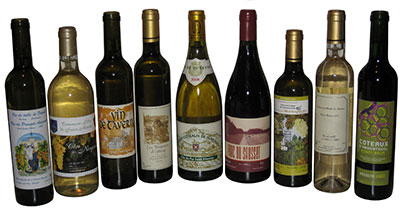 Image: 2010 vintage of VFR wines in bottles,
Image: 2010 vintage of VFR wines in bottles,courtesy of Les Vignerons Franciliens Réunis
So far his work at the Vignerons Franciliens has included drawing up a winemaking charter that can be followed by the winemakers looking for official IGP recognition, applying for planting rights, and lobbying the government for more protection for those citizen winemakers who are simply growing a few vines for pleasure. Balcony vineyards from around France have begun to contact Bersac, aware that they too could benefit from a central group supporting them. ‘All over France, there are wine lovers growing vines on their streets, sharing the harvest with their neighbours. In theory they could be fined, or asked to send their production to the distillery. But many are safeguarding the heritage of French winemaking, growing grapes that have been forgotten by commercial winemakers. They need a voice, and I hope to provide one for them.’

Columnist Introduction
Jane Anson is Bordeaux correspondent for Decanter, and has lived in the region since 2003. She is author of Bordeaux Legends, a history of the First Growth wines (October 2012 Editions de la Martiniere), the Bordeaux and Southwest France author of The Wine Opus and 1000 Great Wines That Won’t Cost A Fortune (both Dorling Kindersley, 2010 and 2011). Anson is contributing writer of the Michelin Green Guide to the Wine Regions of France (March 2010, Michelin Publications), and writes a monthly wine column for the South China Morning Post in Hong Kong, where she lived from 1994 to 1997. Accredited wine teacher at the Bordeaux Ecole du Vin, with a Masters in publishing from University College London.
Click here to read all articles by Jane Anson>>
- Follow us on Weibo @Decanter醇鉴 and Facebook
and Facebook for most recent news and updates -
for most recent news and updates -
All rights reserved by Future plc. No part of this publication may be reproduced, distributed or transmitted in any form or by any means without the prior written permission of Decanter.
Only Official Media Partners (see About us) of DecanterChina.com may republish part of the content from the site without prior permission under strict Terms & Conditions. Contact china@decanter.com to learn about how to become an Official Media Partner of DecanterChina.com.










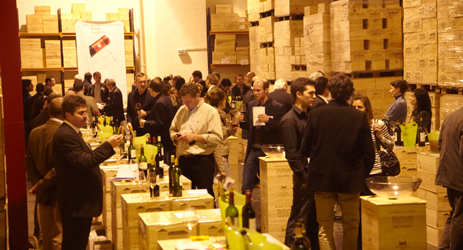
Comments
Submit